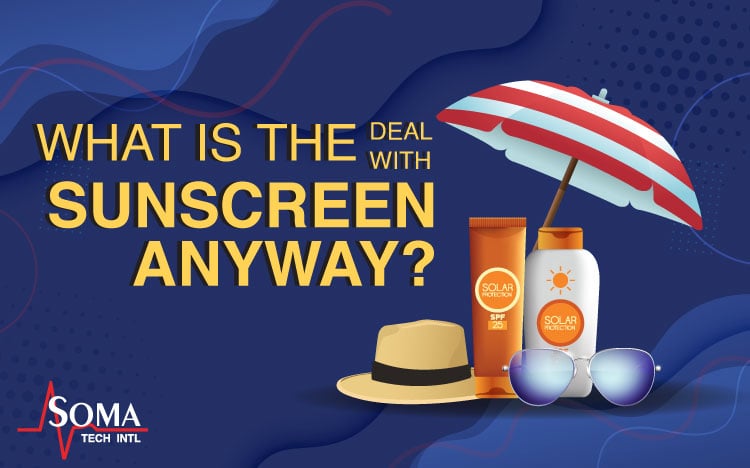What is the Deal With Sunscreen Anyway?
July 6, 2023
What is the Deal With Sunscreen Anyway?
For the last 35 years, we have been told that the sun’s UV rays are dangerous to the human body. These rays will penetrate our skin and lead us to different medical conditions, such as sun poisoning, dehydration, heat stroke, and skin cancer. Keep reading to discover the deal with sunscreen and why it has been in the news lately.
What is Sunscreen?
Sunscreen is a lotion that is specifically designed to put a cover of protection over skin cells so that the cream absorbs the sun’s radiation and not your skin. SPF is Sun Protection Factor, and the varying degrees lend itself to how much protection it gives. Experts say that sunscreen should be reapplied every few hours during the day. They also say that you should avoid spending too much time in the sun during peak sun hours from 10-4. Remember to read the directions on the bottle of sunscreen you purchase to see how often to reapply; each bottle is different.
Why Has Sunscreen Been in the News?
There have been reports that some of the ingredients in sunscreen can seep into the skin through osmosis. These reports claim that these active ingredients can get into your bloodstream. While some scientists believe this to be true, they also say it is not as dangerous as not wearing sunscreen. While there are a variety of sunscreen alternatives, they are still not recommended for long-term use. Some of these alternatives include UPF clothing, wide-brim hats, sunglasses, umbrellas, and neck gaiters. All of these are great combinations of alternatives to sunscreen. When looking to get some of these for yourself, make sure to look for things made up of UPF 50+. The fabric has an Ultraviolet protection factor that can protect you from sun exposure and can help moderate your body temperature.
What Happens If I Don’t Use Sunscreen?
If you don’t use sunscreen, you are maximizing your risk of developing sun poisoning and skin cancer. The sun’s UV rays will damage cell DNA, and that DNA can replicate into a mass or a tumor. If left untreated, the tumor can metastasize to other body parts and cause cancer in those affected areas. Remember, sunscreens should be applied 30 minutes before sun exposure to allow the ingredients to fully bind to your skin.
Does Sunscreen Expire?
Does sunscreen expire? The FDA (Food and Drug Administration) requires sunscreens to stay at full strength for up to 3 years. Some sunscreens have an expiration date on the bottle that indicates when it is no longer effective. If you purchase sunscreen that does not have an expiration date, write the date of purchase on the bottle and discard it after 3 years.
There are two main types of sunscreens, chemical sunscreen, and mineral sunscreen. Chemical sunscreen contains ingredients like oxybenzone, avobenzone, and homosalate, which can oxidize and become less effective over time. Mineral sunscreen contains ingredients like zinc oxide or titanium dioxide that don’t have the same problem as chemical sunscreen, but again over time, they still degrade.
It is also important to remember that these expiration dates stamped on the bottle are only good for shelf life. This means that your sunscreen can expire and degrade faster depending on a few different factors. The main factor is heat. Make sure to keep your bottle in the shade or wrapped up in a towel. The heat will cause your sunscreen to expire faster. If it has been exposed to heat, you should replace it every few months.
Even with the expiration date, experts recommend replacing your sunscreen every year.
Final Thoughts
Have you ever gotten a really bad sunburn that required medical attention? Do you always wear sunscreen? Do you have a recipe for a natural-based sunscreen? Do you or someone you know have survived skin cancer? Comment below! For more information on how to have fun in the summer, click this link.
Explore Other Blog Items By Category
Recent Posts


EKG vs ECG | What’s the Difference Between ECG and EKG?

